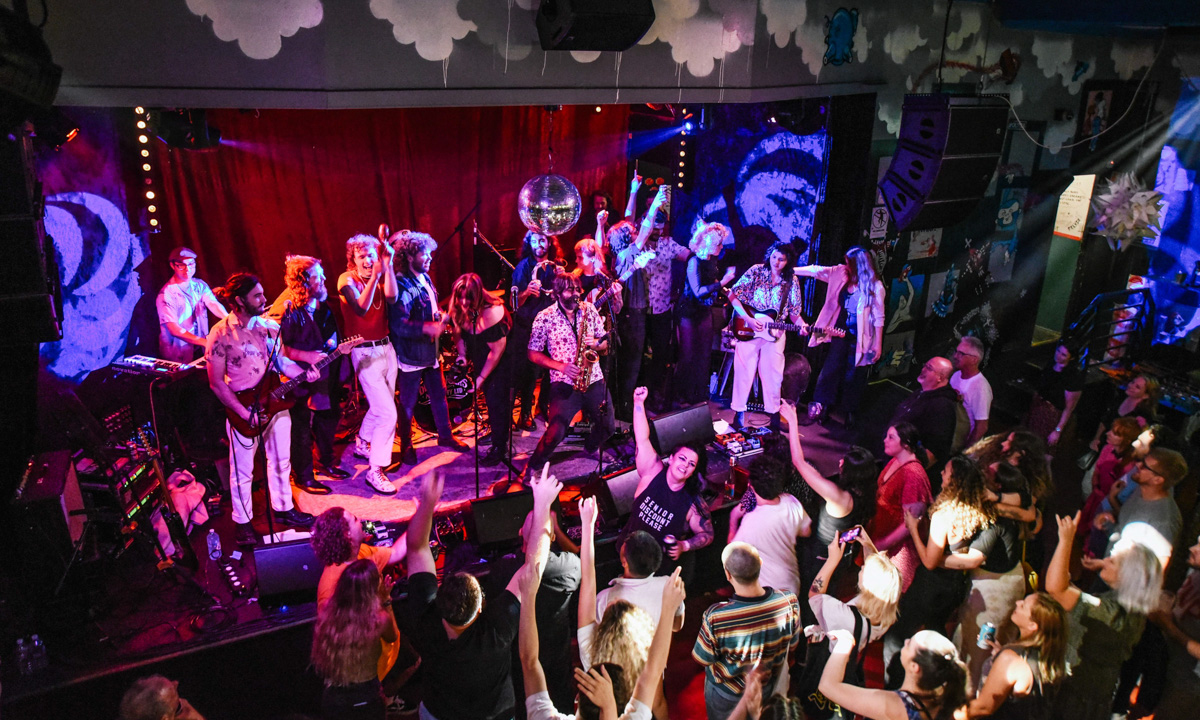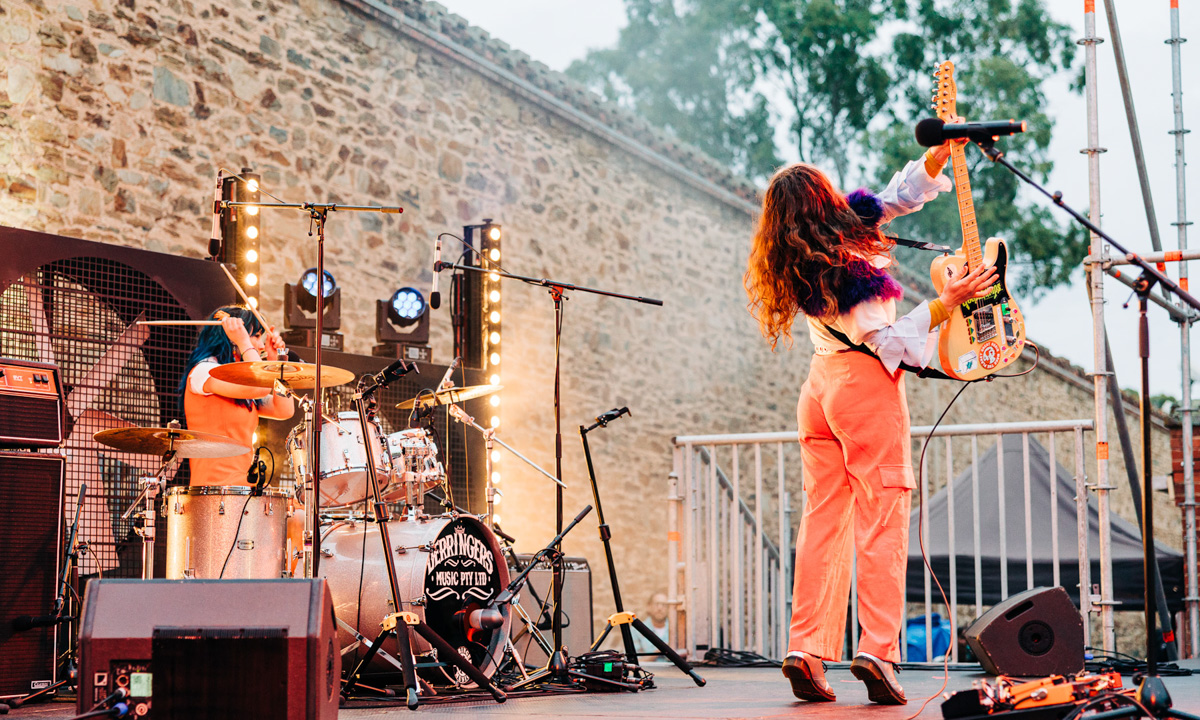New data from MusicSA shows music business knowledge, access and support of live venues, and more government funding are top of mind for SA artists and industry professionals.
Knowledge gaps and decreasing audiences challenging the SA music industry
MusicSA’s inaugural survey of the local contemporary music industry garnered 360 responses from industry professionals, 73.5 per cent of which were artists or musicians — the most represented cohort.
The findings indicate a strong demand for a better-connected industry with sustainable music venues and music businesses to support full-time careers for musicians.
Almost half of the survey respondents derive all or part of their income from non-music professions, with only 24 per cent earning all or part of their income from music.
The data shows that while there are plenty of musicians in the Adelaide scene, knowledge gaps about how to navigate the industry are preventing them from creating sustainable careers.
MusicSA CEO Christine Schloithe says the results paint an uncomfortable picture.
“We have a really strong talent pool, there’s no debating that at all, but the pathways and opportunities for people to progress their careers… those opportunities are few and far between and really hard fought for,” she says.
Of the respondents, nearly 40 per cent have worked in the SA contemporary music industry for more than 20 years, and 25 per cent have been working for more than 10 years; pointing to the experience and commitment from workers.
MusicSA found survey respondents don’t understand how South Australian music organisations such as MusicSA, the Music Development Office, Adelaide City of Music Office and Carclew differ from one another.
There is also a lack of understanding of the structure of SA’s grant, advocacy and government music industry bodies.
“There are glaring gaps in knowledge that our industry has about how our industry works,” Christine says.
“Some people know parts of the industry quite well and can navigate that, but there are systematic gaps in understanding how the industry operates so we can certainly do a lot more work around embarking on education around those and filling in the gaps in that knowledge.”
How industry know-how translates to opportunities
If you’re a regular CityMag reader of our lineup announcements, you’ll know we always look for locals and we’ve noticed when local bands are on festival lineups the same handful of names pop up.
We asked Christine if it was fair to assume that these names are the ones that have more industry know-how, and she said yes.

CityMag found on average, 25 per cent of all acts booked across major SA festivals in 2023 were local acts. Most lineups did well, with Laneway and Harvest Rock the only culprits with just one Adelaide act. This illustration: Isabella McRae
“It’s also fair to say that a lot of the reasons some of those bands are seen so visibility is because they’ve started to break through, they have higher visibility compared to other bands,” she says.
“The survey has let us know it’s difficult for audiences to find out about local artists sometimes so that’s something that can be done on the ground is seeing a change in how we might do local lineups.
“I think we will see a change in how festivals are thinking about programming and curating lineups in the future and I think it’s going to be a diversity that will naturally come into play that we might not have seen before.”
Christine says it’s evident at the moment that there’s a shift away from “the purely commercial parts of the music industry” and a willingness from audiences to try new music. But the survey says people just don’t know where to find it.
A lack of familiarity with local artists is a barrier for audiences seeking out gigs according to 51 per cent of respondents. While 40 per cent also noted the cost of attending live music such as ticket prices, paying for transport, food and drink as barriers.
The lack of local venues was another key barrier identified.

Live music at Hindley Street venue, Jive. This picture: Jack Fenby
What does the industry want to see more of?
When asked whether they thought the state government was working well with the music industry to support locals, 17.5 per cent of respondents strongly disagreed, while 22 per cent selected ‘disagree’ another 22 per cent somewhat disagreed and 22.7 per cent were neutral. Only 0.8 per cent strongly agreed that the state government is working well with the music industry to support locals.
Arts Minister Andrea Michaels told CityMag the Malinauskas Government values the feedback they receive from the music industry, including through Music SA.
“We provide funding to Music SA to represent the local sector and work closely with them on how we can best respond to the industry’s needs,” Michaels says.
More funding and investment from local, state and federal governments was one of the top three priorities respondents said would drive growth in the contemporary music industry.
This followed access and better support of venues so that live music is more sustainable at number one.
The third priority was better promotion and marketing of and for the music industry.
The survey also found knowing how to apply for grants is in high demand, along with clearer information about accessing grants, funding and investment.
Of the respondents who said they have applied for grants in the past 18 months, there was a success rate of 16 per cent.
Christine says that MusicSA is not a funding agency, but it can offer more opportunities to upskill artists in grant writing. However, she says the education piece has to go hand in hand with increased investment from governments or agencies, otherwise they could create a more competitive landscape that’s not viable.
“Grant programs are one of the most singular effective pieces of investments governments can do to support the industry… but we also don’t want to be in a situation where we are working with artists to do grant writing if there is not an increase in investment that is happening too,” she says.

Teenage Joans at the 2021 SA Music Awards. This picture: Samuel Graves
The survey found 9 per cent of respondents earn an income from paid gigs, and 4 per cent earn an income from teaching.
Less than 1 per cent of survey respondents earn an income from streaming, music sales, merch sales or royalties.
Christine says at this stage they don’t know enough about the survey sample and it’s possible they didn’t capture everybody who is earning money this way. But, she says it could point to a genuine lack of revenue opportunity.
“Regardless, the revenue-earning opportunities in the music business at the moment is difficult in South Australia,” she says.
“It is something that can be remedied with a really healthy industry, and that’s where things like export and showcasing a pathway and acknowledging not just live music, but the importance of publishing and composition, and writing music for gaming can certainly be rolled into the bigger picture of how the industry operates.”
What comes next?
MusicSA’s findings have been shared with industry organisations and government and MusicSA will tailor their programs to meet the needs of the local sector.
“I don’t think that there is a single music organisation in South Australia that is not prepared to roll up their sleeves and work harder and to collaborate better in order to leverage outcomes,” Christine says.
“The data in this particular survey gives us a really good opportunity to extend those conversations to direct some of those collaborations into really meaningful areas.”
Christine says they are also looking to the state government’s new cultural policy which will be unveiled in the coming months to see the industry’s desires reflected in it.
“I think there’s a lot going on, and there’s a lot of conversations, a huge desire to want to try and shift things in a local context so that it is a better industry for people to be working in,” she says.
Arts Minister Andrea Michaels told CityMag the MusicSA data will help inform the state’s new cultural policy that is currently being developed.




